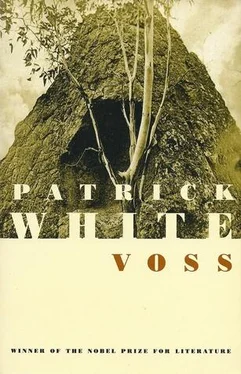He is strong, mused Voss, considering not so much the thick body as some strength of silence of which the man was possessed.
‘When we first come here,’ Judd began dreamily, ‘this was all we had.’ He lathered himself with dreamy soap. ‘I mean, we got here in a dray, along the plain that runs to the South. We had an axe, of course, and a bag of flour, and shovels and things. We had the mattresses. But nothing of importance. I never owned anything of value, except once a gold chain, that got took off me in the street. At home.’
He was lathering his neck and his armpits, which made the dream seem silky, subtler.
‘Then, here was this spring. We found it.’
It was, indeed, as seductive as the lesser jewels. (Is not the poetry of topaz or moonstone more nostalgic than that of diamonds?) Looking at those wet pebbles over which the water was welling, Voss could have put one in his pocket, as if he had been still a boy.
‘I soon was owner of the spring,’ said Judd, soaping himself. ‘I would come and sit here of an evening.’
Circles expanding on the precious water made it seem possible that this was the centre of the earth.
‘Then, you wish to leave all this, all that you have found, and all that you have made, for the possibility of nothing?’ Voss asked, as softly as his foot, which was probing the brown crooks of ferns.
He was very thoughtful.
Judd, who had sluiced himself quickly and brutally, once it had come to that point, had turned round, and was groping for his shirt. The man’s back, the German saw, was laced with scars, of an ugly purple, and the shameful white of renewed skin.
‘Yes,’ said Judd.
He was looking at the water.
‘It is not mine,’ he said, ‘any more than that gold chain, which somebody shook in the street. And when they would take the cat to me, I would know that these bones were not mine, neither. Oh, sir, I have nothing to lose, and everything to find.’
In some agitation, which was only just visible in that thick body and still mind, he began to hurry his visitor away. They walked across the rather harsh bush grass, and skirted a clearing in which, on a rock platform, on a tripod, was the telescope that the convict’s wife had mentioned. It was a somewhat larger instrument than Voss had visualized.
‘What is that?’ he asked, in spite of knowing.
Judd murmured.
‘That is a telescope,’ he said, ‘that I rigged up to look at the stars. But you would not see nothing. It is too weak.’
He hurried the visitor past. He did not wish to communicate anything further, and was, moreover, ashamed of himself for any speculation upon which he had ventured. He was noted, rather, for his practical resourcefulness and physical strength. These were the qualities which had recommended him to Mr Sanderson.
When they had reached hut and horse, Voss held out his hand, and said:
‘We shall assemble at Rhine Towers the day over tomorrow.
‘The day after tomorrow,’ laughed Judd, with strong teeth.
They were liking each other now.
As the light was already bronzed, Voss did not delay in mounting his horse, and was soon climbing the sharp ridge that lay between there and Sandersons’.
That night his hosts told him something of the Judds’ history, in no sustained narrative, however, for what they knew had been put together from fragments, some of which, they admitted, did not fit together. For what crime Judd had been transported, they were not certain, but, on arrival in the Colony, he had been subjected to the greatest brutality and most rigorous kinds of physical labour. He had attempted once to escape, but had been dragged back while still upon the lower slopes of the mountains, through the intervention of God, it would seem, considering the fate of those who remained at large. On another occasion, involved in a mutiny, the ringleaders of which were summarily shot, Judd had been overlooked, again, it would appear, by divine favour. As one of those unfortunate beings who took part in the premature colonization of Moreton Bay, he had met his wife, herself a convict. There were those who doubted whether their union had received the blessings of the Church. If this were true, it had not prevented the tie from enduring many years since the first touch of hands under the giant grasses and teeming moisture of Moreton Bay. The latter part of their sentences the Judds had served more happily in the employment of a Judge-Advocate at Sydney, and it was from his home and upon his recommendation that they had received their pardons.
Voss listened to this with some, though not with great, interest, because he had not discovered it for himself.
But Palfreyman was greatly moved.
‘I will not easily forget,’ he said, ‘my first meeting with the man, and the almost Christlike humility with which he tended one responsible, in a sense, for all his sufferings.’
Voss jerked his head.
‘Your sentiments, Mr Palfreyman, are sometimes stirred to sickliness. However great your sympathy for this individual, it is unreasonable to want to take upon yourself the guilt of a felon, which it must be admitted, he was, to greater or lesser degree.’
Palfreyman looked at Voss.
‘I cannot overcome my convictions, for you, or for anyone, Mr Voss.’
Voss got up. His black boots were squeaking.
‘I detest humility,’ he said. ‘Is man so ignoble that he must lie in the dust, like worms? If this is repentance, sin is less ugly.’
He appeared to be greatly agitated. His skin was a dark yellow in the candlelight. His darker lips were rather twisted.
Palfreyman did not answer. He had composed his hands into an inviolable ball.
Afterwards Voss relented, but most of all towards himself. He was looking about somewhat jerkily in that half-lit room in which his words had fallen. There was a faint tinkling of crystal drops, suspended by silver wires from the sockets of the candlesticks.
Now, in this tinkly silence, he began also to excuse himself after a fashion to Mrs Sanderson, who had averted her face halfway through the foregoing scene, which, obviously, she had found most distasteful.
Ignoring his apologies, she said, however, very kindly:
‘I recommend you to drink a cup of warm milk before you retire to bed. When one is over-tired, it works wonders.’
Voss did not think he would accept her advice, but his eyes were for the moment grateful.
He is a handsome man, of a kind, she saw again, and, I do believe, asking to be saved. She wondered whether she would one day mention this to her husband.
That night Voss dreamed of the goat butter, in which the convict’s wife was about to mould a face. But which face? It was imperative to know. The necessity made his skin run with sweat, long after the inconclusive dream was done, and he lay there turning and tossing in the grey impersonality of sleep.
Next day, their last at Rhine Towers, was a gentle one. On such occasions are last testaments composed. Much was forgiven. The men spent hours conversing with little children. The day had never been more beautiful in that valley, nor had withdrawn more quickly from it in long robes of gold, and blue, and purple.
Just at evening, Voss had gone down to the river of ghostly trout. He was purged since yesterday, possessed even of some of the humility which Palfreyman extolled as a virtue. Standing by the brown waters of the friendly river as it purled and swirled over the stones, and looking back to where the house was fastened, so it appeared, to the bank, with much hopefulness and trust by human hands, the man was drawn nostalgically towards that strength of innocence which normally he would have condemned as ignorance, or suspected as a cloak to cover guile.
So, watching the clumsily-conceived but eventually beautiful house, of which the material structure had begun to dissolve, windows flower with the blurry clocks of candlelight, he could remember the elbows of the young woman as she sat at the piano and played through some insignificant nocturne. Woodenly. For all her grace and superficial self-possession, her cold mouth and warm eye, her small ears, which he now recalled in extraordinary detail, down to the last transparent curve, it was in the quality of rather stubborn innocence that her greatest strength lay. She herself was probably unconscious of what he had but now discovered. So, too, in the baleful garden, when she was indeed a wooden woman, of some ugliness, but strength, her words had struck deeper for their clumsy innocence, and could have delivered, as he had feared, or desired, a coup de grâce .
Читать дальше












